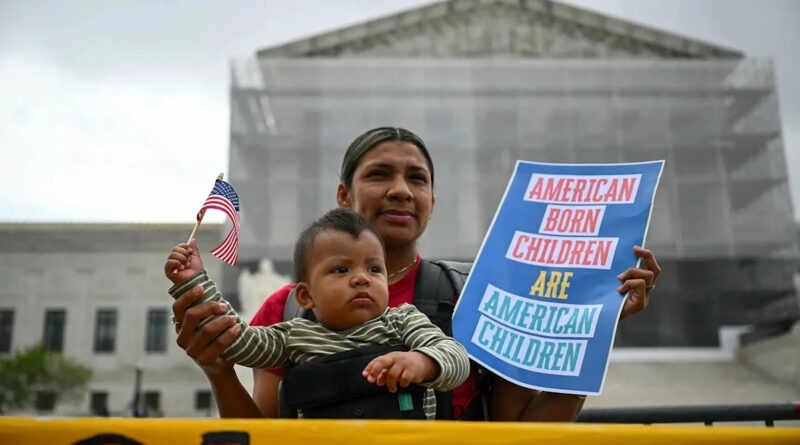For some immigrants, Trump’s policy to end birthright citizenship can go into effect
President Donald Trump’s executive order ending birthright citizenship for the children of some immigrants could go into effect in at least some states, following a U.S. Supreme Court ruling that weakened the power of lower courts to issue nationwide injunctions.
For immigrant parents expecting babies, the ruling will unleash a frantic search for more information about whether the order applies to their prospective children, and possibly a rush to avoid the order in states where it can’t take effect.
While challenges to the executive order move through the courts, the administration will only be blocked from enforcing its order against a more narrow group of people potentially impacted. The Supreme Court ordered the lower courts to “expeditiously” reexamine which plaintiffs will be covered by more narrow injunctions.
Signed hours after he took office, the executive order was quickly blocked by multiple lower federal court judges, who held that the order likely violates the U.S. Constitution. For more than 150 years, the 14th Amendment has guaranteed birthright citizenship, stating that “all persons born” in the United States “are citizens of the United States and of the State wherein they reside.”
The administration asked the Supreme Court to weigh in on the case — not on the executive order directly, but rather on the nationwide injunctions seeking to block it. The administration argued that these orders give too much power to a single judge at the expense of presidential power.
In a 6-3 ruling on a grouping of three cases, Trump v. CASA, Inc., Trump v. Washington and Trump v. New Jersey, a coalition of conservative justices, ruled that “federal courts do not exercise general oversight of the Executive Branch.”
The order, “Protecting the Meaning and Value of American Citizenship,” would exclude two categories of infants from the right to U.S. citizenship: infants born to a mother who is unlawfully in the country and a father who is not a citizen or permanent resident, and infants born to a mother who is authorized to be in the country for a temporary period of time and a father who is not a U.S. citizen or permanent resident.
The latter group includes people in the United States with a work, student or tourist visa. It’s unclear how it would apply to the children of LGBTQ+ couples or single moms. The order directs federal agencies to deprive these newborn babies of legal documents such as Social Security cards and U.S.-issued passports.
Trump’s attempt to end birthright citizenship could leave an untold number of newborn babies in legal limbo while one or both of their parents, including newly postpartum women, face the threat of sudden detention and deportation.
Attorneys general and organizations challenging the executive order argued last month that a ruling in the administration’s favor will cause untold harm to the children of immigrants born on U.S. soil, their families and broader immigrant communities. They also argued that it would bring about chaos for states trying to provide services to newborn children born in legal limbo.
Jeremy Feigenbaum, the solicitor general of New Jersey, told the court that the state would be burdened with having to verify the citizenship of babies who are denied citizenship in one state and then move to New Jersey or any other of the 22 states challenging the order. The result would be “chaos on the ground,” as “people’s citizenship turns on and off when you cross state lines.”
“What Trump and the administration are trying to do is erase our communities and our families from this country entirely. They want to deny citizenship to children born here — our children, our babies — just because their parents are immigrants,” said Ama Frimpong, legal director for CASA, one of the immigrant advocacy groups that sued on behalf of their members and five pregnant women who would be impacted by the order.
“I fear for our future son and for families like ours who may have to navigate a world where their children are rejected by the country they are born in and that they call home. But I pray that will not be the case,” said one of the plaintiffs, a Venezuelan immigrant who asked to be identified only as Monica and who expects to give birth to a child in South Carolina this summer. “We sought freedom in the United States because we believe in this great country, and we believe in the U.S. Constitution it was built on.”
The post For some immigrants, Trump’s policy to end birthright citizenship can go into effect appeared first on The 19th.
News that represents you, in your inbox every weekday. Subscribe to our free, daily newsletter.
